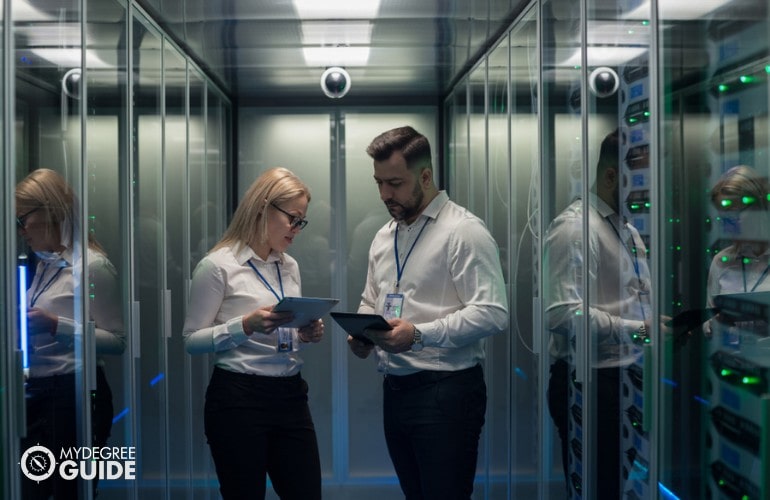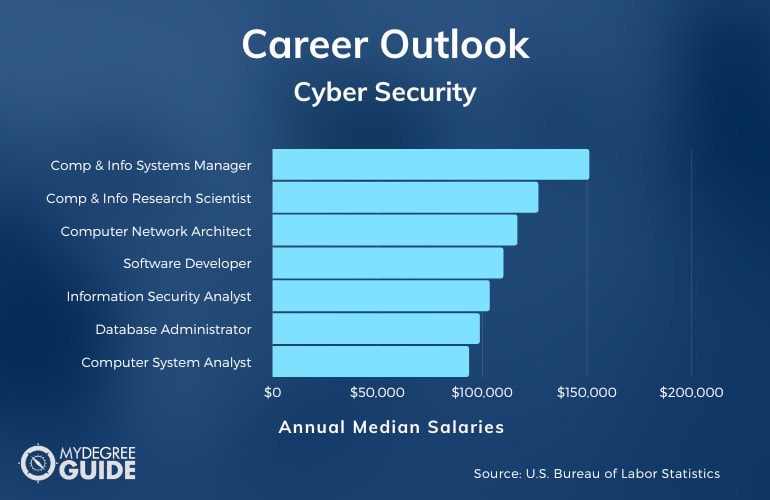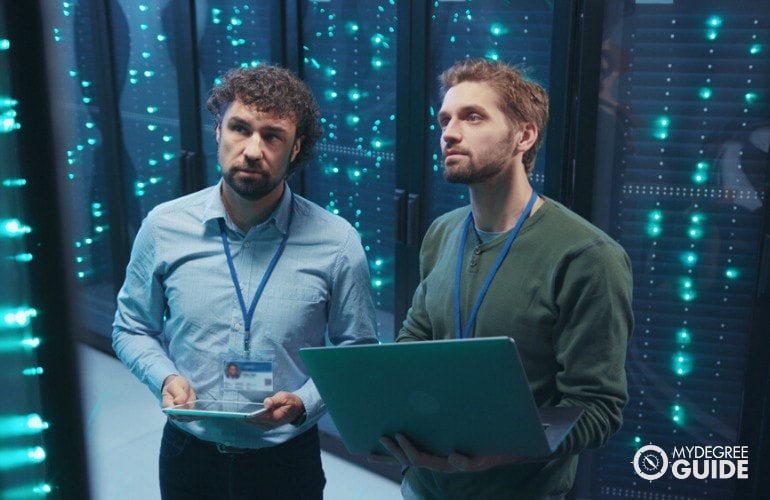Now is an excellent time to get a cyber security masters degree online.

According to the Bureau of Labor Statistics, of the top ten fastest growing occupations today, only one computer job makes the list: information security analyst.
Editorial Listing ShortCode:
In fact, the U.S. is facing a massive unmet demand for workers with cyber security skills. With a cyber security masters degree, you may be able to earn six figures in a job market hungry for workers with the right technical and analytical skills.
Universities Offering Online Master’s in Cyber Security Degree Programs
Methodology: The following school list is in alphabetical order. To be included, a college or university must be regionally accredited and offer degree programs online or in a hybrid format.
1. Bellevue University
Bellevue University’s Master of Science in Cybersecurity offers an online degree program with a variety of courses related to data security, cyber attacks, digital forensics, and more. Students with previous IT experience can take an accelerated course option. This degree prepares students for a cybersecurity career in the public or private sector.
Bellevue University is accredited by the Higher Learning Commission.
2. Champlain College
At Champlain College Online, the Master’s Degree program in Digital Forensic Science gives a comprehensive education in all things cybersecurity. With 24/7 course availability and part-time and full-time options available, Champlain combines flexibility with a distinguished faculty to give students the knowledge and skills they need in this field.
Champlain College is accredited by the New England Commission of Higher Education.
3. DeSales University
DeSales University’s Master’s Degree in Criminal Justice: Digital Forensics combines expert field knowledge with an easy-to-use online platform.
Hybrid courses are available alongside video conferences and purely online courses tailored to students’ individual learning experiences. A 20 percent tuition discount is available to current criminal justice professionals.
DeSales University is accredited by the Middle States Commission on Higher Education.
4. Drexel University
Drexel University’s Online Master’s Degree in Cyber Security trains students in this rigorous, professional field. A theoretical foundation is applied with a curriculum fitted to students’ professional goals from government work, education, information security, and more.
This interactive online environment is convenient, challenging, and features professors with professional experience.
Drexel University is accredited by the Middle States Commission on Higher Education.
5. Eastern Illinois University
At Eastern Illinois University’s online Master’s Degree in Cyber Security, students learn the professional skills necessary to keep corporate and private information safe. This degree focuses on helping working professionals gain the expertise necessary to specialize their skills for a growing and changing job market.
Eastern Illinois University is accredited by the Higher Learning Commission of the North Central Association of College and Schools.
6. Embry-Riddle Aeronautical University
Embry-Riddle Aeronautical University’s Master of Science in Cybersecurity Management & Policy offers student the resources and education to put cybersecurity plans into action.
Whether in the public or private sector, students gain the skills necessary to become successful leaders in this thriving industry. This program provides students individualized networking opportunities.
Embry-Riddle Aeronautical University is accredited by the Southern Association of Colleges and Schools Commission on Colleges.
7. Johns Hopkins University
John Hopkins University’s Master of Science in Cybersecurity presents students a specialized model of the cybersecurity field.
Alongside independent study, students take one of four concentrated tracks: analysis, assured autonomy, networks, or systems. This ensures they are prepared to enter the field of cybersecurity as trained leadership professionals.
Johns Hopkins University is accredited by the Middle States Commission on Higher Education.
8. La Salle University
La Salle University’s Master of Science in Cybersecurity is an online program that lets working professionals reach their degree in less than two years. Students concentrate their areas of study to become trained specialists in their desired field. La Salle’s interdisciplinary curriculum prepares students for any job in the growing marketplace.
La Salle University is accredited by the Middle States Commission on Higher Education.
9. Lewis University
Lewis University’s online Master of Science in Computer Science presents a Cyber Security concentration that lets students take 33 credit hours of advanced courses in this discipline. Students learn the expert principles of cyber security alongside encryption, network security, and more in this flexible program.
Lewis University is accredited by the Higher Learning Commission.
10. Maryville University
Maryville University understands what working professionals need from a Master of Science in Cybersecurity. This completely online program can be completed in as little as twelve months, letting students take classes at their own schedule while quickly gaining the education they need to get ahead.
The Maryville University of Saint Louis is accredited by The Higher Learning Commission.
11. Mercy College
Mercy College’s Master of Science in Cybersecurity is a 2 year, 30 credit hour program. Awarded as a National Center of Academic Excellence by both the NSA and Department of Homeland Security, Mercy College gives students the education they need to become expert cybersecurity professionals who protect data and information from outside threats.
Mercy College is accredited by the Middle States Commission on Higher Education.
12. Mississippi College
At Mississippi College’s Master’s Program in Cybersecurity and Information Assurance, students can take classes entirely online to fit their busy schedules. With graduation as early as 12 months, Mississippi College opens a world of career opportunities to its students as they gain knowledge and security skills at an affordable cost.
Mississippi College is accredited by the Southern Association of Colleges and Schools Commission on Colleges.
13. New York University
New York University’s Master of Science in Cybersecurity is based in the online laboratory VITAL, which combines the resources of New York City universities into an accessible online space.
Students learn from renowned experts the ins and outs of data and information security. A Cyber Ops Specialization is available as an advanced, optional program.
New York University is accredited by The Middle States Commission on Higher Education.
14. Pennsylvania State University – World Campus
Pennsylvania State University’s online World Campus is host to a top line Master of Professional Studies in Cybersecurity Analytics and Operations, recognized by U.S. News & World Report as one of the best in the country.
Students study up-to-date models of information and data security, encryption, and networks from renowned professionals at a flexible schedule. Students can earn an additional certificate in Information Systems Cybersecurity.
Pennsylvania State University is accredited by the Middle States Commission on Higher Education.
15. Regent University
At Regent University’s Master of Science in Cybersecurity, students become experts in protecting data, networks, and digital information from outside threats. With a curriculum that is constantly evolving as technology advances, and an advanced faculty available online, it’s no wonder 60% of Regent graduates are hired by Fortune 100 companies.
Regent University is accredited by the Southern Association of Colleges and Schools Commission on Colleges.
16. Robert Morris University
Robert Morris University’s Master of Science in Cybersecurity and Information Assurance is available online in both a 3-semester and 4-semester course plan. Students receive an advanced education that prepares them to lead teams in design and development of security systems. This is a 30 credit hour degree program.
Robert Morris University is accredited by the Middle States Commission on Higher Education.
17. Stevenson University
At Stevenson University, the online Master’s Degree in Cybersecurity and Digital Forensics is taught by a professional faculty with extensive job experience. A career-focused program, students receive the education and training they need alongside networking support to secure a job post graduation in this advanced and growing field.
Stevenson University is accredited by the Middle States Commission on Higher Education.
18. Syracuse University
Syracuse University’s Master of Science in Cybersecurity knows what students need to succeed in this growing marketplace.
Faculty members have training ranging from NSA and private sector experience, allowing students to learn the theories they need alongside practical assessment and application. This 30 credit hour program’s classes are in live HD.
Syracuse University is accredited by the Middle States Commission on Higher Education.
19. University of Arizona
The University of Arizona’s Master of Science in Cybersecurity is an online program awarded for excellence by the NSA and US Department of Homeland Security. Students receive an interdisciplinary education from three U of A colleges to master data and information security skills for when they enter the marketplace after graduation.
The University of Arizona is accredited by the Higher Learning Commission.
20. University of Charleston
The University of Charleston’s Master of Science in Cybersecurity is an online program that can be completed in less than three years. Students practice information security, encryption, transaction security, and data storage to keep online systems safe.
This education is paired with a philosophy of real-world application to prepare students for the job market.
The University of Charleston is accredited by the Higher Learning Commission.
21. University of Dallas
At the University of Dallas’s Master of Science in Cybersecurity, industry professionals offer theory and its applications in system defense and data security. Students not only become experts but learn the skills to become industry leaders in this growing field. A variety of course topics are available for a well-rounded education.
The University of Dallas is accredited by the Southern Association of Colleges and Schools Commission on Colleges.
22. University of Delaware
The University of Delaware’s Master of Science in Cybersecurity is an online degree program awarded by the NSA and US Department of Homeland Security. This program’s focus on industry leadership alongside advanced knowledge makes it well-suited for students who want to rise in the industry of cybersecurity and data protection.
The University of Delaware is accredited by the Middle States Commission on Higher Education.
23. University of Maryland Global Campus
The University of Maryland Global Campus offers a Master’s Degree in Cybersecurity Management and Policy built to train leaders in encryption and data protection. Coursework involves theoretical knowledge and real life application. Near graduation, students have the chance to present work to a Chief Executive Officer of a corporation.
University of Maryland Global Campus is accredited by the Middle States Commission on Higher Education.
24. University of Rhode Island
The University of Rhode Island’s Professional Science Master’s Degree in Cyber Security is geared toward professionals aiming to get a degree while they continue to focus on their careers. Several concentrations are offered for students to gain expertise in a specific field, including Forensics and Incident Response.
The University of Rhode Island is accredited by the New England Commission of Higher Education.
25. University of San Diego
The University of San Diego’s Master of Science in Cyber Security Operations and Leadership prepares students to enter the advanced technology field of data and information security. This degree not only gives students the education and information they need, but also the skills to lead a team and direct projects.
USD is accredited by the Western Association of Schools and Colleges Senior College and University Commission.
26. University of Southern California
At the University of Southern California online, the Master of Science in Cyber Security Engineering is a solid choice for graduate students pursuing their career or advancement to doctoral degrees. Students receive the same lectures as on-campus USC students. Full and part time enrollment are available.
USC is accredited by the Western Association of Schools and Colleges.
27. University of the Cumberlands
At the University of the Cumberlands Online Master’s in Digital Forensics, students receive the technical skills to counter cyber attacks and keep networks and data secure. The curriculum includes communication and forensic science courses to round out the engineering education that makes up the core of this degree.
The University of the Cumberlands is accredited by the Southern Association of Colleges and Schools Commission on Colleges.
28. Utica College
Utica College’s Master of Science in Cybersecurity is a 2 year, 30 credit hour program. This program’s focus is to give students the education they need to protect data information, whether they go into education, government, or business related fields.
This degree program has been recognized for its excellence by the EC-Council and the Defense Cyber Crime Center.
Utica College is accredited by the Middle States Commission on Higher Education.
29. Webster University
Webster University’s Master of Science in Cybersecurity offers a well-rounded education in system security, encryption, and data protection. Students take 36 credit hours in cybersecurity theory, its applications, and how to take a leadership role in team environments.
A dual degree option is available, combined with the Master of Arts in National Security Studies.
Webster University is accredited by The Higher Learning Commission.
30. Western Governors University
At Western Governors University’s online Master’s Degree in Cybersecurity, students undertake rigorous coursework to engage in the critical thinking, engineering, and forensic science work that prevents cyber crimes.
This two year degree offers an up-to-date curriculum delivered by experienced professors at a flexible online schedule. EC-Council certifications in this field are available with the degree.
Western Governors University is accredited by the Northwest Commission on Colleges and Universities.
Cyber Security Master’s Degrees Online

As more and more data migrates to the cloud and gets passed between multiple users and databases, there’s an urgent need for information security specialists.
These skilled professionals may manage networks, safeguard troves of sensitive data, understand data protection laws, and assess system vulnerabilities and breaches and respond swiftly to cyber threats.
As the rate of data storage and transfers increases exponentially, cyber threats are also growing more widespread, contributing to the alarming gaps between supply and demand in the field.
The good news is that more and more schools are offering online cyber security masters programs to help meet this demand.
With this online cyber security degree, you may look forward to rewarding jobs in software development or in IT administration and data security in any number of industries, but especially consulting, banking and finance, government (including national defense), and healthcare.
Information security analysts may pursue various specializations as well, such as managing networks and user protocols, concentrating on legal and regulatory compliance, conducting cyber security software testing, monitoring network safety, conducting specialized cyber forensics (analyzing malware and breaches), or doing risk assessment in the wake of cyber attacks.
You’ll have to decide which are the best cyber security masters programs for your career interests, as well as for your schedule and budget.
The good news is that an online master’s program will typically offer you more flexibility to juggle outside commitments such as jobs and family, as well as a greater selection of schools, with less geographical constraints.
Cyber Security Careers & Salaries

There are a variety of different careers that are possible after earning a masters in cyber security. In this field, senior information system analysis and engineering research roles will require more education, such as a master’s degree, but will likely pay more too.
If you work for a cyber security software company, you’ll likely have chosen to specialize in software development, algorithms, and cryptography methods in order to help develop cyber security applications.
The goal of such products is to safeguard data, identify or neutralize malware threats, or support diagnostic testing, simulations, or forensic analysis.
According to the Bureau of Labor Statistics, the median annual salary for jobs in the cybersecurity field is $103,590. Below are the median salaries for some of the highest paid jobs often requiring a masters degree in cyber security or computer engineering:
| Careers | Annual Median Salaries |
| Computer and Information Systems Manager | $151,150 |
| Computer and Information Research Scientist | $126,830 |
| Computer Network Architect | $116,780 |
| Software Developer | $110,140 |
| Information Security Analyst | $103,590 |
| Database Administrator | $98,860 |
| Computer System Analyst | $93,730 |
| Computer Programmer | $89,190 |
| Network and Computer Systems Administrator | $84,810 |
| Web Developer | $77,200 |
As you can see, with so much unmet demand for cyber security specialists, many high-paying careers may result from an online masters in cyber security.
If you work in today’s vast data-intensive industries, such as cloud storage, finance, defense, or healthcare, among others, then you might serve as an information safety planner or as a threat management specialist.
Also needed are individuals who focus on the role of network architecture and computer programming as it relates to cyber security and safeguarding sensitive data transfers and storage.
Another important role, for those with more administrative skills, involves staying up to date on legal and regulatory frameworks. This may mean helping your team implement the proper compliance measures for handling sensitive data and staying informed about privacy laws relevant to the kind of data in your industry.
Exposure to online environments also requires special safeguards, so companies that transfer data through website platforms also need IT specialists with cyber security training.
Choosing a Cyber Security Masters Online Program

When choosing a cyber security masters program, you’ll of course want to compare tuition costs and how different programs align with your present work or family commitments.
Other considerations are perhaps equally or more critical.
1. Consider how course concentrations fit into your career interests.
Even in a very specialized field like cyber security, there are still distinct pathways, such as:
- Network management
- Enterprise compliance
- Risk monitoring and management
- Computer programming related to cyber security needs
- Teaching
- Consulting work
If you are set on working in an actual cyber security company, you’ll probably want courses giving you a solid foundation in computer engineering skills, such as information security software development, cryptography, and computer engineering courses.
2. Consider the industry alliances that various schools may have developed.

In a new, fast-changing, and highly specialized field like cyber security, the shortage of qualified workers may mean that the schools you are considering are also competing for the most qualified and informed cyber security teachers.
With this in mind, you may want to do a little extra research and see what kind of industry alliances different schools have developed to provide the most up-to-date training and most current insights into innovations in the field.
These kinds of school-to-industry alliances may also turn in to job “pipelines” for graduates and may mean your selected school can better inform you about the best jobs and most urgent technical needs in this fast-changing and technical field.
Masters in Cyber Security Curriculum & Courses

If you do pursue a cyber security masters degree online, here are the kinds of courses you’ll likely be taking:
- Information Network Security: Learn about best practices and authentication tools and procedures for keeping shared networks secure, both in terms of user behaviors, information transfers, and system hardware and software.
- Introduction to Cybersecurity Concepts: Students will be introduced to key technical aspects of cyber threats and learn about malware and penetration strategies and about cyber security concepts.
- Information Safeguards Testing: An introduction to methods for testing, monitoring, and auditing large IT systems and data and communication networks to control for data protection and implement appropriate levels of cyber security tools and protocols.
- Information Security Law and Standards: Learn about the standards and laws governing the definition and safeguarding of different types of data across public and private sectors and about compliance with a range of information security laws and regulations.
- Cryptography: Learn the techniques used for encoding and decoding data in compliance with privacy laws and standards and for protecting against illegal or unethical data theft.
- Cyber Threat Forensics: Learn skills for investigating the origins and impact of cyber threats, identify penetration vulnerabilities, identify different kinds of malware, and learn methods for responding to attacks and countering ongoing threats.
- Risk Assessment Management: This class helps students develop the objective management and analysis tools they need to oversee effective assessment of cyber threats and professionally monitor security safeguards and protocols, informing enterprise cyber security decision making and planning.
- Data Extraction and Processing for Machine Learning: Learn the science of automated data mining processes used to drive rapidly evolving artificial intelligence applications, as these pertain to data transfers, privacy, and data protection.
- Cybersecurity Engineering: Learn about methods for integrating information security safeguards into information systems, tools, and networks and about engineering methods for cyber security applications and integrations.
- Cybersecurity Simulations: Learn skills for doing “ethical hacking” and advanced threat forecasting and risk assessment by designing or simulating new malware advances and penetration strategies or identifying latent software or network vulnerabilities.
As you can see, getting a masters online in cyber security will require some background in computers, math, and analytic thinking, but your courses may open doors to a range of jobs slated for strong growth over the next ten years.
Cybersecurity Master’s Degree Program Admissions Requirements

While they vary from program to program, here are some of the admissions requirements that many schools have for masters candidates in cyber security:
- Since cyber security involves all aspects of computer science, most programs require candidates to have a bachelor’s degree with related mathematical, IT, and software engineering skills.
- Most schools will require applicants to provide transcripts for prior college coursework and degrees.
- GRE/GMAT scores are required by some schools, but not all.
Once you gain entry to an online cybersecurity masters program, be aware that you may need to take additional courses as prerequisites for specific graduate level courses.
The kinds of knowledge required might include familiarity working with specific software languages or understanding key fundamentals of computer programming or computer systems architecture.
You may want to ask admissions counselors to help you assess if there are any gaps in prerequisites that you should be aware of as you consider admissions requirements.
Cybersecurity Degree Programs Accreditation

When you’re looking at school and program options to find the best cyber security masters program for your goals, we recommend you consider only fully accredited schools and degree programs.
Accreditation means a recognized, independent body has certified the academic standards, requirements, and quality of the school and the degree program you’re interested in.
This helps ensure you’re getting good value for your investment of time and money and that the degree you earn is recognized by employers and other institutions of learning. The Council for Higher Education Accreditation (CHEA) has more information on accreditation and can help you identify accredited schools and programs.
Cybersecurity Programs Financial Aid and Scholarships

If you’re wondering how you’ll pay for your online cyber security masters degree, keep in mind that you may qualify for federal school loan assistance or other tuition assistance opportunities from your state government. You may also be eligible for employer-based tuition assistance.
In fact, because there is a growing gap between supply and demand when it comes to qualified cyber security job candidates, you may find even more opportunities for educational support.
You may want to check out resources offered by the Scholarship for Services Program of the National Initiative for Cybersecurity Careers and Studies (NICCS). Or, you can ask the financial aid counselors at prospective schools for more information about programs like this or other scholarship or tuition assistance programs.
If you are interested in qualifying for a federal loan, a good place to start is by completing the required federal loan application form (FAFSA).
What Can You Do With a Cyber Security Masters Degree?

Within this “narrow” field, there’s almost nothing you can’t do with a cyber security masters degree—but keep in mind the need to zero in on the right specialization for your aptitudes, background, and career preferences.
According to the Bureau of Labor Statistics, the cyber security field includes high-level jobs in information security research and engineering, information systems management and network administration, database administration, cyber security software development, and computer system analysis and programming.
As you can see, these job roles cut across many sectors, and you may find other unique cyber security opportunities in national defense agencies as well. Finally, your cybersecurity masters may unlock another vein of opportunities within the cyber security software development industry and its related legal and commercial activities.
As you learn about schools and programs, compare cyber security courses offered by different types of colleges, such as cyber security programs in schools with advanced research departments vs. programs housed in more vocational schools vs. programs in schools that teach law or business administration.
How Much Does a Cyber Security Masters Degree Program Cost?

You’ll find that with a masters in cybersecurity program online, tuition varies significantly across schools.
Most schools will charge by credit hour, with a typical online masters in cybersecurity requiring 28 to 36 credit hours. Tuition for many fully accredited online programs costs between $550 and $1,400 per credit hour, with some schools charging even higher rates.
If you’re interested in attending a state college or university, don’t forget that non-resident tuition costs tend to be significantly higher than those for residents. Be sure to verify your resident status and your school’s residency requirements.
Finally, as you calculate all of your costs, including time commitments, remember to take into account your earnings potential and opportunities for additional promotions and salary increases over the span of your new career!
How Long Does it Take to Get a Cyber Security Masters Degree Online?

The amount of time it will take to complete an online masters degree depends on how much time you are able to commit to coursework each semester. If you attend as a full-time student each semester, it should take about two years to complete your online cybers ecurity master.
Since many schools design their online programs to offer students greater flexibility or to accelerate the pace of learning, you may find that some programs allow you to complete your coursework in as little as 18 to 20 months.
If you’re trying to work and study at the same time, or if you have other outside commitments, you’ll probably need more time to finish.
Is There Any Affordable Cybersecurity Online Master’s Degree Program?

Yes, you may find affordable programs to complete a masters in cyber security. You should find quite a few schools offering competitive rates to help make online learning accessible to everyone.
The lower range of tuition costs for this degree are around $450 to $600 per credit hour, for programs that on average will require about 32 to 36 credit hours. Online learning may also help you save money in travel and living expenses.
Keep in mind that tuition rates for graduate degrees, such as a masters or PhD cyber security online degree, will usually be higher than tuition rates for a bachelor’s degree at the same institution.
Is a Cyber Security Masters Worth it?

Yes, a cyber security masters is worth it for many students. In computer and information technology field, jobs are projected to grow at a rate of 11% in the next 10 years (Bureau of Labor Statistics), much faster than the average for all occupations.
Common cyber security jobs in this field include software development and engineering, cryptography and cyber threat forensics expert, threat response specialist, system and network administration, legal compliance and consulting, technical consulting, research and teaching, and cyber ops roles in national defense and intelligence.
Because there is such high demand for qualified talent in the field, you should also find higher education, government, and industry consortiums ready to help you and connect you with interested employers once you’ve finished your online masters.
We know that there is already lots of demand and diverse pathways within the cyber security field. Projections for opportunities will grow immensely over the next decade.
Within two to three years and with your cybersecurity masters in hand, you might find yourself looking out into a future with nearly unlimited possibilities.
Getting Your Cyber Security Masters Degree Online

Are you ready to get started and help fill one of today’s most critical workforce shortages?
By getting an online cybersecurity master’s degree, you may be poised to choose among any number of software and IT job openings across a range of industries and offering lucrative pay, or you may be recruited to support national defense or to help with teaching cyber security at a college or vocational school.
Also keep in mind that while most concentrations in the field involve highly technical roles and applications, this fast-growing industry should also see a strong demand for cybersecurity degree holders with concentrations supporting broader leadership duties as well—legal advising, policy development, corporate and government consulting jobs, and other senior IT management positions.
If all of this sounds compelling to you, start exploring options for masters in cyber security today!
